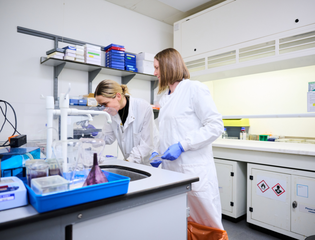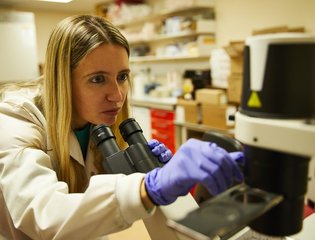Our Researchers Pave the Way for Ovarian Cancer Immunotherapies
Immunotherapy is a game-changer in cancer treatment, harnessing the body's immune system to fight cancer cells. However, there is still a lot of work to be done towards developing immunotherapy treatments for ovarian cancer.
At the 2019 HHMT International Forum on Ovarian Cancer, Ovarian Cancer Action awarded £600,000 to two exciting immunotherapy projects which set out to help provide more effective and kinder treatments for women with ovarian cancer.
Immunotherapy has had great success in other cancers such as melanoma, and we’re hoping to unlock the next breakthrough so more women can survive ovarian cancer. We take a look at the progress our researchers are making towards this.
What is immunotherapy?
Immunotherapy is a new and effective treatment that turns the body’s immune system against cancer. It boosts the body’s immune system, enabling it to recognize and eliminate cancer cells whilst leaving healthy cells alone. Unlike chemotherapy's indiscriminate approach, immunotherapy targets cancer cells with precision, sparing healthy tissue meaning fewer side effects.
How are Ovarian Cancer Action funded researchers working towards immunotherapies for ovarian cancer?
Enhancing the immune response to ovarian cancer
Professor Ahmed and his team at the University of Oxford are attempting to develop a type of immunotherapy called adoptive T-cell therapy which uses the body’s own immune cells. T-cells are a part of our immune system and attack foreign molecules including cancer cells, however, cancers are sneaky and can evade or suppress our immune system, so the T-cells don’t work well.
In adoptive T-cell therapy, T-cells are taken from the patient and enhanced to kill cancer cells in the lab, then returned to the patient. To ensure this type of therapy is effective you need to know which T-cells are best at killing cancer cells so Ahmed and his team will study which T-cells are most effective.
So far, the team are learning how different groups of immune cells respond to tumours. For example, how groups of immune cells in the fallopian tube (where ovarian cancer is believed to start) have memory towards cancer cells, preventing tumours from growing and spreading. This knowledge could help towards developing highly personalised therapies. The team will continue to understand how the immune cells respond to tumours including finding targets, which can both then be utilised into developing a new treatment.
Fighting ovarian cancer with advanced virus therapy
Professor Graham Cook and his team at The University of Leeds are looking for a way to use ‘oncolytic viruses’ to stop the cancer from suppressing the immune system, allowing it to attack and kill the cancer. These viruses kill cancer cells and deliver molecules to restore the activity of the body's immune cells. Oncolytic viruses have proven to be safe in clinical trials and one has been approved for use in melanoma skin cancer treatment (T-VEC). The team are hoping to develop a treatment for ovarian cancer. But before attempting clinical trials, it is necessary to understand the behaviour of treatments under laboratory conditions.
So far, the team have shown that their virus has the potential to stop the suppressive immune cell populations found in ovarian cancer. They will next look into how this therapy works by testing in human ovarian cancer patient samples and combining their virus with other drugs to see if this improves the response. The team will now continue this work to hopefully get the potential therapy ready for a clinical trial.
One Step Closer to Success: Advancing Immunotherapy for Ovarian Cancer
The journey towards effective immunotherapy for ovarian cancer is ongoing. Our dedicated researchers are tirelessly working to fine-tune their treatments for real-world application. Every breakthrough brings us closer to providing women with better chances in their fight against ovarian cancer.

